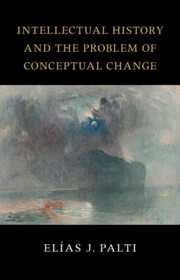Book contents
- Intellectual History and the Problem of Conceptual Change
- The Seeley Lectures
- Intellectual History and the Problem of Conceptual Change
- Copyright page
- Contents
- Preface
- Acknowledgments
- Introduction
- Chapter 1 Pocock, Skinner, and the “Historiographical Revolution”
- Chapter 2 The Republican Genealogy and the Normative Temptation
- Chapter 3 The Problem of Conceptual Change
- Chapter 4 Conceptual History
- Chapter 5 Koselleck’s Begriffsgeschichte
- Chapter 6 Hans Blumenberg and the Theory of Nonconceptuality
- Chapter 7 From Structuralism to Poststructuralism
- Chapter 8 Foucault’s Archaeology of Knowledge
- Chapter 9 The Archaeological Project and the Ignored Epistemic Mutation
- Chapter 10 Behind the Structures and the Subject
- Conclusion
- Epilogue
- Quoted Bibliography
- Index
Chapter 2 - The Republican Genealogy and the Normative Temptation
Published online by Cambridge University Press: 02 May 2024
- Intellectual History and the Problem of Conceptual Change
- The Seeley Lectures
- Intellectual History and the Problem of Conceptual Change
- Copyright page
- Contents
- Preface
- Acknowledgments
- Introduction
- Chapter 1 Pocock, Skinner, and the “Historiographical Revolution”
- Chapter 2 The Republican Genealogy and the Normative Temptation
- Chapter 3 The Problem of Conceptual Change
- Chapter 4 Conceptual History
- Chapter 5 Koselleck’s Begriffsgeschichte
- Chapter 6 Hans Blumenberg and the Theory of Nonconceptuality
- Chapter 7 From Structuralism to Poststructuralism
- Chapter 8 Foucault’s Archaeology of Knowledge
- Chapter 9 The Archaeological Project and the Ignored Epistemic Mutation
- Chapter 10 Behind the Structures and the Subject
- Conclusion
- Epilogue
- Quoted Bibliography
- Index
Summary
Chapter 2 critically approaches Skinner’s historical oeuvre and its problematic connection with his own theoretical perspective. It begins by analyzing his major work, The Foundation of Modern Political Thought, and his perspective regarding the origins of the modern concept of State. In it, we can observe the tension between his theory and the teleological perspective underlying that project. This problem indeed became more noticeable in his recent works addressed to trace the remote roots of “classical republicanism,” as associated to a “third idea of liberty”: the concept of “liberty as non-domination.” It then continues by analyzing the differences between Skinner’s and Pocock’s views of classical republicanism, and its connection with their different definitions of political languages. Lastly, we observe here how the normative temptation that fuels both Skinner’s and Pocock’s proposals of recovering classical republicanism entails an instrumental use of intellectual history aimed at making it play into the present, which inevitably leads to relapse into conceptual anachronisms.
Keywords
- Type
- Chapter
- Information
- Publisher: Cambridge University PressPrint publication year: 2024

